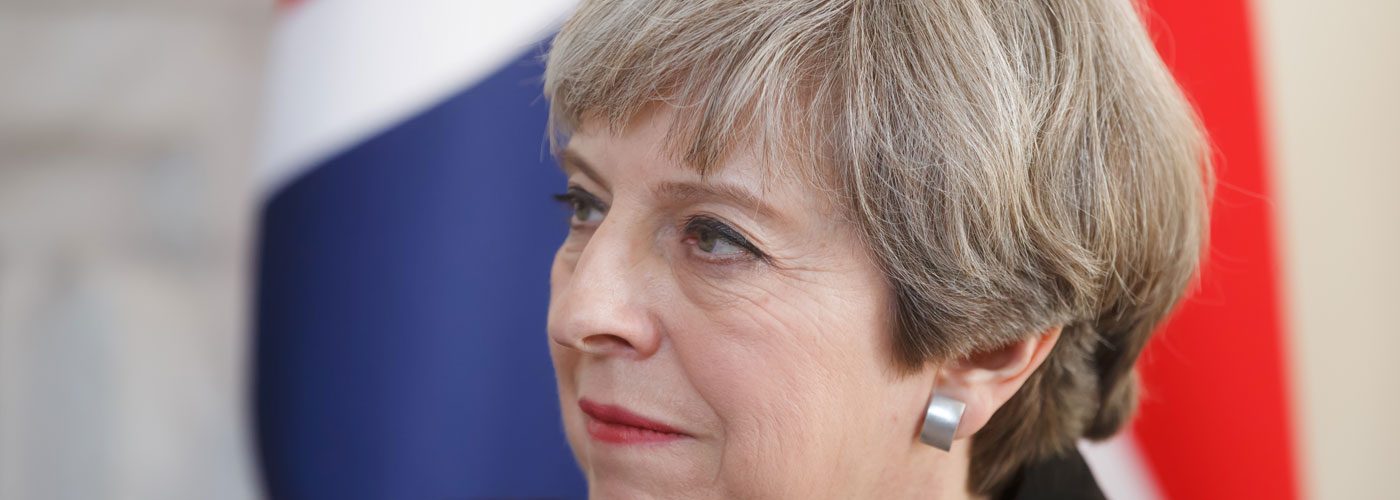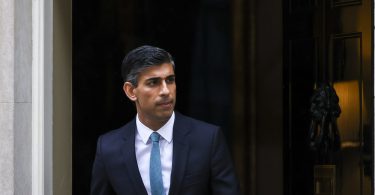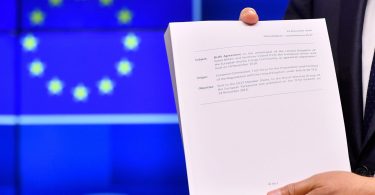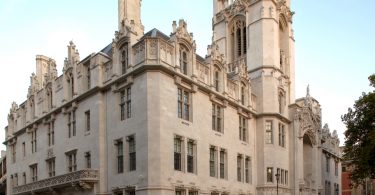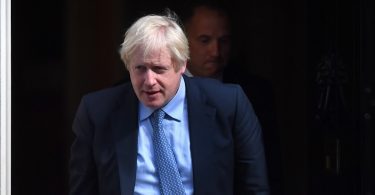The Prime Minister is now on the hunt for “legal assurances” from the EU about the Northern Ireland backstop. Her purpose is to persuade the House of Commons, including the DUP, to back her deal. So far, she seems to have got nowhere. But it is quite possible that after some ritualistic tussling, she will come back from Brussels waving a piece of paper that she claims is a “legal assurance”, and will ask MPs to modify their opposition to her deal.
It is vital to understand what the problem is. The problem is what happens if there is deadlock in negotiations. That problem will not be solved, or even meaningfully mitigated, even if Mrs May were to come back from Brussels with 100% of what she is asking for. Regrettably, the entire exercise in which she and her “negotiator” (a reference to his job title rather than his capabilities) are engaged is not intended to change the deal she has agreed, but only the perception of it.
Mrs May’s exercise will cloud the real issue by seeking to divert the debate on to arcane and recondite questions about the precise legal status of “interpretative agreements” about treaties, or of minutes of the European Council. No such instruments can possibly solve the lock-in problem created by the Northern Ireland Protocol which forms part of the legally binding Withdrawal Agreement (WA).
The problem: you cannot judicially enforce an obligation on two parties to agree with each other
The Attorney General’s letter of advice to the Cabinet explained with great clarity the reasons why the UK could find itself locked in to the Northern Ireland so-called “backstop” Protocol with no legal escape route, and that in such circumstances the Protocol would “endure indefinitely”. The advantage of the Attorney’s advice to Cabinet is not that it says anything unexpected, but that it is stripped of the misleading obfuscations which cloud the government’s public statements about the legal effects of the Protocol. (For example, in No 10’s misleading “rebuttal” of my Spectator Article on the deal which implied that a failure by the EU to replace the Protocol with a future trade agreement could be remedied by arbitration.)
Mrs May’s claims that the Protocol is just a “backstop” or “insurance policy” that will never come into effect are based on Article 184 of the WA. This contains an obligation on both the EU and the UK to use their “best endeavours in good faith” to negotiate a future relationship agreement based on the Political Declaration, “to the extent possible” in time to prevent the Protocol coming into effect. This Article in the WA is complemented by wording within Articles 1 and 2 of the Protocol itself which state that it is intended to be superseded by a future relationship agreement and/or “intended to apply only temporarily”.
The problem with all these provisions is that the Political Declaration is just a vague outline of a future relationship which leaves many important points of principle, as well as all the detail, unresolved. The EU could not be legally adjudged as acting in “bad faith” if it chooses to interpret the Political Declaration in the way most favourable to its own interests and those of its Member States. This is compounded by the fact that the Political Declaration (in another disastrous own goal by UK negotiators) envisages a form of future agreement between the EU and the UK which will require ratification by each Member State individually as well as by the EU itself.
The upshot is, as President Macron made crystal clear on the day the WA was agreed, France will be able to insist on its demands being met over EU fishing boats having continued access to UK waters as a condition of France ratifying a future agreement which would release the UK from the “backstop” Protocol. Spain will be in a similar position regarding its demands over Gibraltar, and there will no doubt be further demands both foreseen and unforseen that will be raised by member states and by the EU itself.
The Attorney’s letter poses the question (at 13): “But what happens if both parties, pursuing their best endeavours in good faith, are simply unable to agree a superseding agreement within a reasonable time, or indeed at all?” He answers this question as follows (at 16): “Therefore, despite statements in the Protocol that it is not intended to be permanent, and the clear intention of the parties that it should be replaced by alternative, permanent arrangements, in international law the Protocol would endure indefinitely until a superseding agreement took its place, in whole or in part, as set out therein. Further, the Withdrawal Agreement cannot provide a legal means of compelling the EU to conclude such an agreement.”
After considering the so-called “review mechanism” under which the Protocol can be replaced with other suitable arrangements, the Attorney (at 29) confirms that these good faith duties “could not require the parties to a negotiation to set aside their fundamental interests”, and that conduct on the part of the EU that could be found to breach its best endeavours obligations would be “highly unlikely”. He then concludes:
“30. In conclusion, the current drafting of the Protocol, including Article 19, does not provide for a mechanism that is likely to enable the UK lawfully to exit the UK-wide customs union without a subsequent agreement. This remains the case even if the parties are still negotiating many years later, and even if the parties believe that talks have clearly broken down and there is no prospect of a future relationship agreement. The resolution of such a stalemate would have to be political.”
So when we consider any “legal assurances” being sought by the Prime Minister, the question we need to ask is not “do they have some legal effect or other”, but rather: “do they have a legal effect which changes the conclusions in the Attorney’s advice to Cabinet?”
Mrs May’s pre-Christmas summit disaster
Mrs May’s first attempt to secure “assurances” from the EU did not go well. It is worth comparing what she sought from the EU in advance of the summit on 13 December 2018, and the actual outcome of the summit. This is possible because of the leaking of a draft text which was apparently the outcome of pre-summit discussions between Mrs May’s negotiator and European Council President Donald Tusk’s assistants.
The summit “conclusions” (the formal record of what was resolved by the leaders) begin by reconfirming its endorsement of the Withdrawal Agreement, and saying that: “The Union stands by this agreement and intends to proceed with its ratification. It is not open for renegotiation.”
Below is a comparison of the draft with the final text of conclusions 3, 4 and 5 adopted by the EU27 summit meeting. Deletions are shown struck through and additions in boldface.
“3. The European Council underlines that the backstop
[does not represent a desirable outcome for the Union. The backstop]is intended as an insurance policy to prevent a hard border on the island of Ireland and ensure the integrity of the Single Market. It is the Union’s firm determination to work speedily on a subsequent agreement that establishes by 31 December 2020 alternative arrangements, so that the backstop will not need to be triggered.
4. The European Council also underlines that, if the backstop were nevertheless to be triggered, it would apply temporarily, unless and until it is superseded by a subsequent agreement that ensures that a hard border is avoided. In such a case, the Union would use its best endeavours to negotiate and conclude expeditiously a subsequent agreement that would replace the backstop, and would expect the same of the United Kingdom, so that the backstop would only be in place for as long as strictly necessary.
5.
[The Union stands ready to examine whether any further assurance can be provided. Such assurance will not change or contradict the Withdrawal Agreement.]The European Council calls for work on preparedness at all levels for the consequences of the United Kingdom’s withdrawal to be intensified, taking into account all possible outcomes.”
The outcome of the summit meeting was described by Peter Foster, the Telegraph’s Europe editor, as “an absolute kicking” for Mrs May. First, the leaders rejected her request to include language in para 3 saying that the backstop would not be “a desirable outcome” for the EU. Instead, they inserted a firm reminder that a purpose of the backstop Protocol is to “ensure the integrity of the Single Market.” This is an indication that the EU will take a firm line about any replacement arrangements which the UK proposes, and will reject any alternative proposals which they consider might lead to goods which do not conform with Single Market rules crossing the Irish land border into the EU single market.
Secondly, the insertion into para 4 of the words “and would expect the same of the United Kingdom” is a salutary reminder of the central problem of the “best endeavours” clause in the WA, which is that the EU can quite lawfully propose harsh terms, and then blame the UK for not accepting them.
Thirdly, the EU27 leaders rejected out of hand Theresa May’s request that they should provide a “further assurance.” Instead, they inserted a clause stating that the EU stands ready to deal with “all possible outcomes”, i.e. a “no-deal” Brexit.
On her return to the House of Commons to report on the summit, Mrs May claimed that the statements in the summit conclusions that the backstop was intended to be temporary represented some kind of concession to the UK. They are nothing of the sort. Conclusion 3 simply reflects the language which is already in Article 184 of the WA. For the reasons clearly explained in the Attorney General’s advice to the Cabinet, that language does not solve the problem of the UK being locked into the backstop Protocol with no means of escape.
Theresa May’s attempt to extract “assurances” from the EU was comprehensively rejected. But let us suppose that she had managed to obtain everything that she asked for. What difference would it have made?
The answer is: none whatever. The EU could have said: “We really, really intend the backstop Protocol not to come into force or to be temporary, or hope to die”. No such statements or assurances solve the basic problem, which is that the UK is locked into the Protocol unless and until the EU agrees to release us, and nothing compels the EU to release us except on terms (however harsh) that they choose to impose on us in legitimate pursuit of their own interests.
Theresa May’s pursuit of bogus “assurances”
In order to avoid a vote of no confidence in her leadership, it is reported that Theresa May promised that she would seek and obtain “legal assurances” from the EU about the backstop. It is also reported that she made similar promises to the DUP.
There is only one way in which legally effective assurances could be given that the UK would escape from the trap identified in the Attorney General’s advice. The legally binding treaty obligations to be undertaken by the UK must be modified, at minimum to give the UK a clear right to exit from the Protocol if no replacement agreement can be reached.
But there is no indication whatever that our Prime Minister is even seeking any such change to the legal obligations which will be imposed on the UK by the WA if we ratify it. Still less is there any indication that the EU would be willing to make any such change to the WA: their summit conclusions were quite clear that the WA is “not open to renegotiation.”
They are even ruled out by the text which Theresa May unsuccessfully pleaded with the EU27 leaders to insert about a “further assurance”: the text she asked for in 5 would have included the clear restriction: “Such assurance will not change or contradict the Withdrawal Agreement.”
So what exactly is the Prime Minister now asking for? The Times reported on 3 January 2019 that Foreign Secretary Jeremy Hunt “Pressed on the issue, said that Mrs May was aware changes would have to have “legal force”. “We’re not asking for anything new but we are asking [the EU] to define what temporary means so we can have confidence we’re not going to be trapped in the customs union for ever against the wishes of the British people.”
But defining what “temporary” means achieves nothing at all, in the absence of a legal right in the part of the UK to escape a negotiating deadlock in the event that the “temporary” period is exceeded. There is no indication at all that the Prime Minister is asking for any such thing.
Instead, the exercise is one directed only at the perception of the legal obligations imposed by the WA, not at the substance of them. It is possible that the EU27 leaders will perceive it to be in their interests to soften their previous stance and to hand out some warm sounding “interpretative statement” about the backstop. This could lead to an irrelevant farce, in which the precise legal effects of agreements on the interpretation of treaties are discussed. The UK government may even rush off to register such an instrument at the United Nations in order to give it a spurious appearance of legal effectiveness, or possibly have it blessed by the Dalai Lama or the Pope.
But the “legal assurances” which Theresa May is seeking from the EU will make no difference whatever to the UK’s legal obligations, and will not solve the problem so lucidly identified in the Attorney General’s advice to the Cabinet. The entire exercise is one of perception management rather than of substance.
Invoking the Vienna Convention
A further area of possible obfuscation seems to be opening up, with the idea that the House of Commons could pass a resolution approving the deal but specifying that the UK should be entitled to invoke some kind of right to escape from the Protocol based on the Vienna Convention on the Law of Treaties.
A pre-Christmas amendment proposed by Sir Edward Leigh MP suggested that the UK would have the right to exit the backstop in the event of deadlock because of “fundamental change of circumstances”. More recently a paper by three distinguished legal commentators (“How to Exit the Backstop”, Verdirame et al, Policy Exchange) rightly rejected the Leigh approach on the ground that a negotiation deadlock is eminently foreseeable when the treaty is signed and therefore cannot be relied upon as “fundamental change of circumstances”.
However, they suggested instead that the UK should rely on Article 60(1) of the Vienna Convention which reads:
“A material breach of a bilateral treaty by one of the parties entitles the other to invoke the breach as a ground for terminating the treaty or suspending its operation in whole or in part.”
They go on to suggest that when formally agreeing to the Withdrawal Agreement, the UK should make an interpretative declaration “that the UK will regard a breach by the EU of the “best endeavours” obligation, such that it would render the backstop more than temporary, as a material breach of the Withdrawal Agreement, and perhaps also include a statement that the UK would also regard itself as entitled to suspend or terminate the Protocol if other circumstances indicated that it could no longer be regarded as temporary.”
The first weakness in this suggestion is that if the UK were to walk away unilaterally from the Protocol alleging breach by the EU, the EU could invoke the arbitration mechanism under the WA. The arbitrators could then find the UK to be in breach by walking away and direct that the UK should honour its obligations under the Protocol. This would be a disastrous outcome to risk.
The more fundamental weakness in their suggestion is that it assumes that a deadlock in negotiations will be an indicator that the EU has breached the “best endeavours” clause in the Treaty. By itself, a break down in negotiations is no such thing. The obligation to use “best endeavours” to reach an agreement is imposed equally on both parties, not just on the EU. So if an agreement cannot be reached, in principle it is just as likely to be the result of the UK’s breach of its own obligation to use “best endeavours” as a breach by the EU of its obligation.
The authors of the Politeia paper comment on the leaked diplomatic note from Sabine Weyand (Michel Barnier’s deputy) to EU27 member states, which was reported in The Times on 14 November 2018.
https://www.thetimes.co.uk/edition/news/may-accused-of-betrayal-as-she-unveils-brexit-deal-ks9frvbwz
The Times reported her diplomatic note as follows:-
In a further concession Mrs May has agreed to “level playing field” measures tying Britain to EU rules in areas such as state aid and environmental and workers’ rights protections during the backstop.
Sabine Weyand, the deputy to Michel Barnier, Europe’s chief negotiator, told European ambassadors that this concession would be used as the basis of the future relationship with the EU. She also said that Britain “would have to swallow a link between access to products and fisheries in future agreements”, in a leaked note of the meeting on Friday.
“We should be in the best negotiation position for the future relationship. This requires the customs union as the basis of the future relationship,” Ms Weyand said. “They must align their rules but the EU will retain all the controls. They apply the same rules. UK wants a lot more from future relationship, so EU retains its leverage.”
The authors of the Policy Exchange paper claim:-
“It is worth noting that the leaked diplomatic note from the EU’s Deputy Negotiator, Sabine Weyand, rather worryingly indicates that the EU may not be taking the “best endeavours” obligations as seriously as it ought to. Ms Weyand’s suggestion that the Protocol is in effect permanent and requires the customs union as the basis for the future relationship is flatly inconsistent with a good faith interpretation of the EU’s obligations under the Protocol.”
Unfortunately the authors’ suggestion that the EU would be in breach of its “best endeavours” obligation if it does indeed follow through on the negotiating approach in Ms Sabine’s note is wishful thinking. Unpleasant as it is from the UK’s point of view, there is nothing in Ms Sabine’s note as reported in The Times which is inconsistent with the wording of the Political Declaration; nor is it inconsistent with good faith for a party to international negotiations to advance its own interests vigorously and to take full advantage of the strengths of its negotiating position.
In practice, overwhelmingly the most likely outcome of any attempt to argue that the EU is in breach of its obligations in the event of a negotiating deadlock would be a finding by arbitrators that neither party was in breach of its “best endeavours” obligation: it is just that each party using its best endeavours and acting in good faith and properly advancing its own interests cannot find common ground between them. This outcome would be disastrous for the UK, since it would keep us locked in to the Protocol with no way out, as explained in the Attorney General’s advice.
Regrettably, the suggestion in the Policy Exchange paper that a declaration about invoking the Vienna Convention offers a plausible escape route from the problem of a deadlock in negotiations seems to be clutching at straws. The Attorney General at para 29 of his advice to Cabinet said that it would be “highly unlikely” that the EU would engage in conduct that would make the EU vulnerable to a finding of breach of its “best endeavours” obligation. He pointed out that a finding that the EU was in breach of this obligation “would require clear and convincing evidence of improper motive and wilful intransigence.” That advice is and remains correct, and there is no magic escape route from the deadlock problem under the Vienna Convention.

